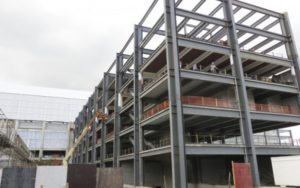Matéria publicada no Jornal The Washington Post (EUA) mostra que Brasil não irá entregar várias obras previstas para o Mundial da FIFA que começa em Junho, como o centro de mídia em Curitiba, o monotrilho em São Paulo, a ampliação no aeroporto de Fortaleza e as obras de mobilidade em Cuiabá. A professora Olga Firkowski, do Observatório das Metrópoles, colaborou com a matéria.
Brazilian officials are giving up on some unfinished World Cup projects
CURITIBA, Brazil — The six-story metal skeleton jutting out from the World Cup soccer stadium here was to be the international media center. But when the games start next month, the world’s journalists will be housed in tents in the parking lot beside it.
“FIFA had a plan B,” said Reginaldo Cordeiro, the city hall official in charge of Curitiba’s World Cup preparations. “The building will not need to be utilized.”
World Cup ambitions and reining in expectations as officials concede they are running out of time. Curitiba’s media center is the latest casualty, but numerous projects will be left half-finished, delayed until after the tournament or simply abandoned.
A monorail to link Sao Paulo’s domestic airport Congonhas, to the south of the city, was originally planned for the World Cup but will not be ready until 2015. Work on the new terminal 3 at the city’s crowded Guarulhos International Airport is ongoing; just eight of a planned 25 airlines will be operating at the terminal during the World Cup.
In the northeastern city of Fortaleza, work to expand a passenger terminal will not be complete, and the airport authority said an “interim terminal” will be installed for 90 days instead. In Cuiabá, a planned light-rail system is unlikely to be open before the end of the year, at best.
As Brazil races to finish, concern is already growing about whether Rio de Janeiro will be ready to host the 2016 Summer Olympics. John Coates, a vice president of the International Olympic Committee, recently said the city’s preparations so far were “the worst I have experienced,” though he later added he was confident the city could still deliver “excellent Games.”
Soccer-mad Brazil has won the World Cup five times, more than any other country, and the 2007 decision to award the country the tournament was greeted with euphoria. “Football is not just a sport for us,” then-president Luiz Inácio Lula da Silva said at the ceremony at the time. “It’s more, it’s a national passion.” Officials vowed to be ready.
The southern city of Curitiba, with a population of more than 1.7 million and a strong middle class, should have been one of the 12 host cities where most things went right. The city is renowned for its efficient urban planning and integrated bus system. But its World Cup preparations are as late and as chaotic as any other Brazilian city’s.
Instead of building a new stadium, the city opted to renovate one belonging to a local soccer team, Atlético Paranaense, to meet FIFA’s rigorous standards. Officials say the stadium will be finished on time, but on a recent day, workers swarmed the site.
“Brazil is a last-minute country. It will be ready, but at the last minute,” said Airton Oratz, a worker just a few yards from another in flip-flops laying paving blocks out front. “Just details are lacking.”
On that day, those details included 27,000 missing seats, which FIFA General Secretary Jérôme Valcke pointedly referenced at a news conference late last month. “You need a seat. You cannot stand,” he said.
Leia a matéria completa no site do Jornal Washington Post.










